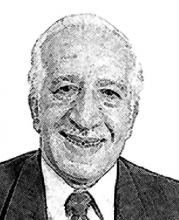You are here
‘Unveiling many hidden facets of the modern history of Jordan’
Feb 28,2015 - Last updated at Feb 28,2015
Mudar Badran, statesman and former prime minister, published this week his memoirs which are a compendium of answers to three enigmatic questions.
The first is the untold story of the decision-making process at the Royal Court during the tumultuous 30 years of labyrinth politicking 1964-1994.
The second regards how Jordan could have saved millions of Iraqis and Kuwaitis the scourge of suffering in the 1990s if the Arab League had accepted King Hussein’s appeal when he persuaded Iraqi president Saddam Hussein to withdraw his invasion forces from Kuwait voluntarily weeks before the American-led coalition had any troops in the region.
The third concerns the exigencies which forced Jordan to refuse the invitation to join the Camp David talks between Egypt and Israel, hosted by US president Jimmy Carter in the 1970s.
Underestimation of Saddam’s psychological profile led to his provocation and overreaction by sending troops to Kuwait. It happened when he felt the humiliating remarks and offence following the Jeddah mediation meetings between Kuwaiti crown prince Saad Al Abdallah Al Salim Al Sabah and Iraqi vice president Izzat Ibrahim Al Douri.
That led to the Gulf war, with its outcome: hundreds of thousands of soldiers killed, billions of dollars wasted, Arab sovereignty slaughtered, oil revenues mortgaged to buy more arms and a US military presence established.
Again, the psychological profile of King Hussein was neither understood nor properly estimated when Egyptian president Anwar Sadat preferred to be the star in his Camp David talks with Carter and asked to delay an invitation to Jordan to participate on equal footing as defender of Palestinian and Jordanian rights, though its territorial integrity had been violated.
It took 15 years to rectify the situation: In October 1994, the Jordanian-Israeli peace treaty was ratified.
What makes Badran’s memoirs significant is his sharp memory when he recollects his lengthy meetings with Saddam or with Syrian president Hafez Assad.
Badran’s political mind imbues his analysis with a certain touch of prophetic knowledge.
Jordan has not yet published a white book about the developments which led to September 1970, with its tragic toll on all strata of society.
In these memoirs, we find many answers to the hardcore questions that the new generations of Jordanians need to know.
Badran should be congratulated for unveiling many hidden facets of the modern history of Jordan.












